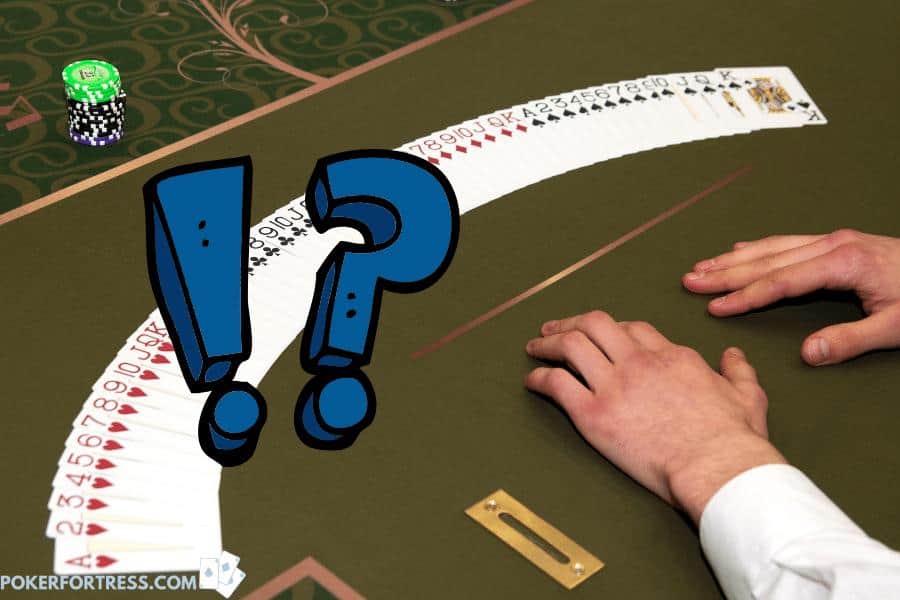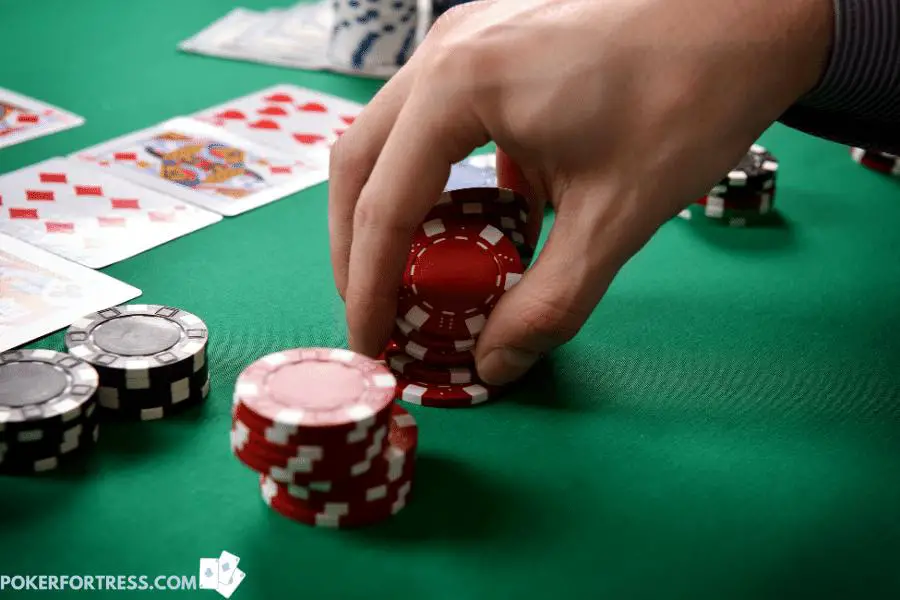It’s common to see some poker players confused about some of the things happening at the tables. And one of such things is seeing dealers tapping on the table. In this article, we’ll be fully explaining why poker dealers tap or knock the table.
The reason why poker dealers tap the table is to signal the end of all action on a betting round. If for whatever reason someone got skipped (which is extremely unlikely), they have a chance to say something before the dealer shows the flop.
Many actions in the casino are announced with hand gestures and poker dealers do this also.

Why do poker dealers tap the table?
We’ve already established that poker dealers tap the table to announce the end of the betting round. If you visit the casino regularly, you may also notice poker dealers tapping their tips on the table before putting them. The reason for this is to signal to the floor supervisor as well as the cameras that the money or chips they are putting away are a tip.
Poker dealers tapping the table also come in handy in today’s casinos where a lot of players wear headphones. The dealer may have announced that the betting round is coming to an end. Players listening to music will most likely not hear this but when they see the dealer tapping the table, they get the information trying to be passed across. At this point, tapping tables is pretty much automatic for poker dealers.
Sometimes the dealers quickly turn their palm upwards, wiggle their fingers, and even shake their hands. This is to show the camera that they are not palming chips. Casinos do not joke with their money and that’s why they have tons of cameras inside the house.
Why do poker players tap the table?
Poker players also tap the table for various reasons. There is no standard reason for poker players tapping the table and you have to understand the situation for you to know what the player means.
Some players tap the table when they have a “good/nice hand”. It’s also common to see poker players tapping the table when someone is all-in. Tapping the table is their way of wishing the all-in player good luck.
There are players that only tap the table when they win or lose. For those that tap the table when they win, it’s a way of celebrating their winnings. Players that tap the tables when they lose are showing their anger or disappointment at losing the hand.
Other Responsibilities Of Poker Dealers
You know poker dealers do a lot more than just tapping the table and announcing the end of a betting round.
Poker dealers have expert knowledge of the game and have many responsibilities to keep the game going smoothly.
Some of those responsibilities will be discussed below.

Managing The Pot
One of the most important responsibilities that a poker player must fulfill effectively and efficiently is managing the pots at the table. The pots here refers to the betting pool or money players bet at the end of each round. Generally, chips are more commonly used at the tables than cash. And a good poker dealer must ensure that the pot reaches the correct player after the betting round has ended.
The poker must have an eagle eye, tracking the activities of each player, and making sure that they are making the right amount of bet. While a player may not know what the current bet is, the dealer isn’t afforded such luxury. The dealer must be able to put the players through whenever they are confused or have a question during the game.
Antes and blinds are forced bets that must be paid by all and some of the players respectively. It’s the responsibility of the dealer to see to this and immediately notify anyone that’s yet to pay.
Managing the pot is no easy task and this is why casinos have a rigorous screening procedure when hiring dealers. Even after that, the dealer still has to undergo some training before he/she can be able to manage the pot effortlessly. But the reward is a nice salary, which mostly comes from tips.
Verifying Payouts With Accuracy
Poker dealers must be able to verify payouts with accuracy. Proficiency in mathematics is a skill poker dealer must-have. By simply looking at the chips, a good dealer should be able to determine the total chip count. Also, the dealer must ensure that the players get the right pay-out at the end of each round.
Also, the dealer has to track the movement of chips on the table and be able to determine the exact amount (in poker chips or cash) that is at the table at the end of each betting round. If there is a tie during a showdown between two players, the dealer must ensure both players receive equal amounts of poker chips.
For this to be done with ease, a poker dealer must be very familiar and even memorize the amount for each chip color. And the only way a dealer can achieve this is through experience. This is why casinos organize playing sessions for dealers during training as they need lots of practical experience to be adept at their job.
Just ask a poker dealer what the total amount of your chip is. All he/she has to do is to take a look at your chips and their total value will be determined with precise accuracy.
Monitoring And Maintaining Fairness Of The Game
Why should anyone play a game that’s not fair? And this is why poker players are tasked with the responsibility of monitoring and maintaining the fairness of the game. Each round of the poker session must go smoothly without any trouble. Also, the dealer must be fair to all players. He/she cannot help any player or try to influence the game in their favor.
The best way for a dealer to ensure a fair game for everyone is to properly shuffle the cards, then deal the cards in the proper manner. This way, nobody is favored and all the players are given fair chances of winning.
A good poker dealer must be vigilant and be aware of the happenings at the table. He/she must ensure that cheating of any kind does not occur at the tables. Fairness cannot be overemphasized in poker. Should a casino develop a reputation for not being fair, they’ll quickly lose the trust of people easily. And you can imagine what that means.
The dealer will be held responsible if cheating occurs at the tables or if he isn’t fair to all players. Should a poker dealer see a player spying on his opponent’s cards or even stealing chips, he/she must notify the supervisor immediately.
Reading Hands Quickly
It is the poker dealer that declares the winner of a hand at the end of the betting rounds or during the showdown. For the dealer to be able to do this, he/she must be adept at reading the players’ hands at the end of the final betting round and then declare the winner with great accuracy. There must be no mistake when declaring the winner of a hand.
A dealer must have no trouble accurately reading hands for hours. And this is why it is important for casino dealers to have concentration and focus in abundance.
Shuffling And Dealing Cards
There is also the shuffling cards aspect which must be done accurately to ensure that the players get random cards. At the same, care must be taken by the dealer to ensure that the players aren’t aware of each other’s cards. There are various shuffling techniques available. It’s common to see poker players shuffling cards with a combination of different techniques to make the cards as random as possible. And care must be taken during shuffling to ensure that the cards aren’t damaged by the action.
The cards must also be dealt with properly after shuffling. Dealers typically deal cards in a clockwise manner starting from their left. It’s important that the cards are dealt face down without being visible to other players.




